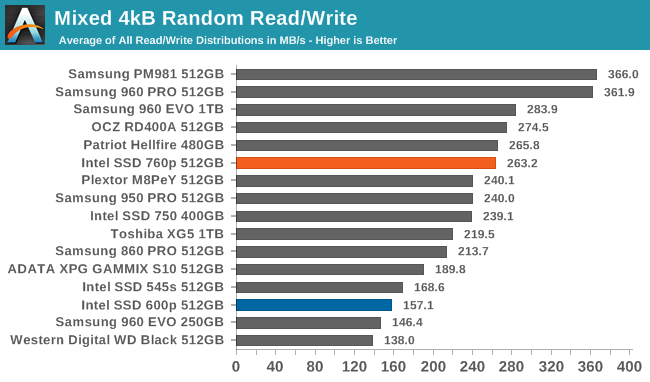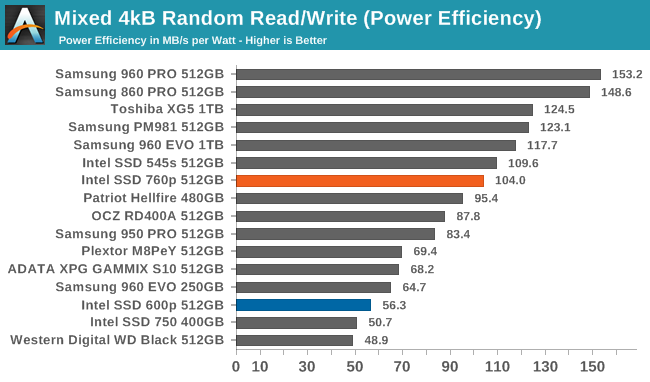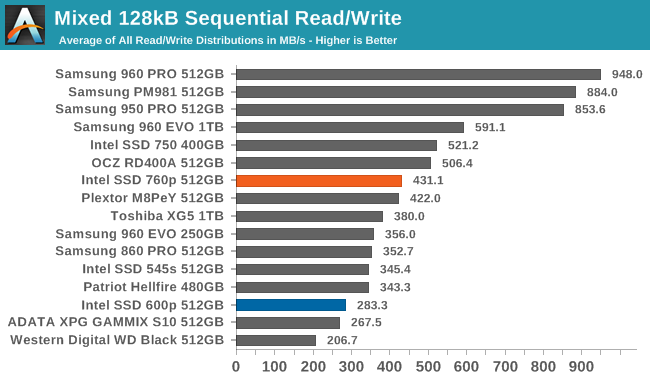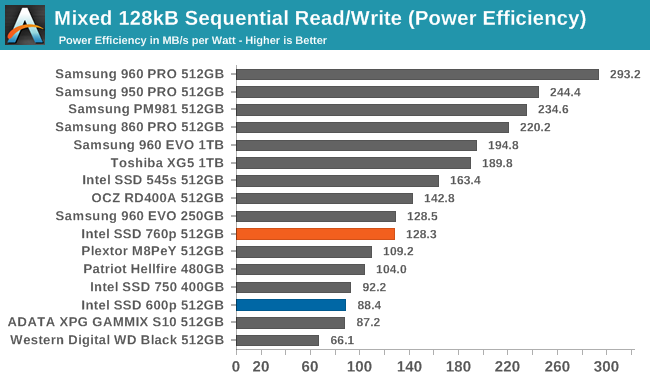The Intel SSD 760p 512GB Review: Mainstream NVMe Done Right
by Billy Tallis on January 23, 2018 11:30 AM ESTMixed Random Performance
Our test of mixed random reads and writes covers mixes varying from pure reads to pure writes at 10% increments. Each mix is tested for up to 1 minute or 32GB of data transferred. The test is conducted with a queue depth of 4, and is limited to a 64GB span of the drive. In between each mix, the drive is given idle time of up to one minute so that the overall duty cycle is 50%.

The overall performance of the Intel SSD 760p on the mixed random I/O performance is quite high for a TLC-based drive. Samsung's PM981 is much better, but the 512GB 760p is almost as fast as the 1TB Samsung 960 EVO. The 760p is clearly a viable competitor to the non-Samsung drives that use MLC NAND flash.

The Intel SSD 760p does not score quite as well for power efficiency as it does for raw performance on the mixed random I/O test, but it is still above average and far better than previous Intel SSDs.
 |
|||||||||
The random I/O performance of the Intel SDD 760p increases gradually but steadily as the proportion of writes increases. It's a good sign that there are no dips in performance along the way, but the performance on the final phase of the test with a pure random write workload is not competitive with the high-end SSDs.
Mixed Sequential Performance
Our test of mixed sequential reads and writes differs from the mixed random I/O test by performing 128kB sequential accesses rather than 4kB accesses at random locations, and the sequential test is conducted at queue depth 1. The range of mixes tested is the same, and the timing and limits on data transfers are also the same as above.

The average performance of the Intel SSD 760p on the mixed sequential workload test does not exceed the limits of a SATA link, but it does clearly beat the best speed achieved by a SATA drive on this test. Previous budget NVMe SSDs have failed to even match the fastest SATA SSDs due to the use of slow TLC NAND.

The power efficiency of the Intel SSD 760p on the mixed sequential I/O test is not great. It only beats drives that were notably slow (600p, WD Black) or unusually power-hungry (Intel 750, Plextor M8PeY). Samsung and Toshiba have set a much higher standard.
 |
|||||||||
The Intel SSD 760p performs much worse during the first half of this test, when the workloads are more read-heavy. By contrast, Samsung's NVMe SSDs tend to be at their worst during the second half of the test. The Samsung drives are much faster at either end of the test when the workload is either pure reads or pure writes, and this helps the Samsung drives secure a clear lead in performance.










51 Comments
View All Comments
rrinker - Wednesday, January 24, 2018 - link
It's not just the speed, it's the handling. A better analogy might be one of the supercars that can hit 300mph.See, in my 25mph residential neighborhood, I often have people running up behind me wanting to go 40 or more. Then I take a turn without touching the brakes, and suddenly they disappear from my mirror. But then my 1993 pickup truck can do the same, so I guess I don't need my BMW after all.
Only - one of those old hard drives I still have in a drawer from 1993 just won't keep up with even the worst SSD I could buy.
Pastuch - Monday, January 29, 2018 - link
The difference between a PC and a BMW is one of them will help you keep your virginity and the other will help you lose it. If the PC is a status symbol to you then I'd suggest you skip your next upgrade and buy yourself a new wardrobe. A 1080 Ti does not equal a hotter girlfriend.megapleb - Tuesday, January 23, 2018 - link
That's certainly the result i expect, but in a review, it feels like something that should be shown repeatedly. Without those results, I think the benchmarks can mislead people into poor buying decisions.Makaveli - Tuesday, January 23, 2018 - link
The Intel 750 still looks like the better drive to me just higher power usage.The $482 price from newegg is also outdated.
I can pick up a brand new 750 drive in Canada for $218 CAD which is $175 USD which is cheaper than the $199 price you have listed for the 760p.
The choice is obvious.
Billy Tallis - Tuesday, January 23, 2018 - link
I try to only make buying recommendations that our readers could actually follow through on. There is not much stock of new Intel 750s left, and even less that could be had for the kind of prices you're quoting. I wouldn't trust anyone selling a "new" 750 for $175 unless it was clearly a liquidation sale from a retailer that was going bankrupt.Makaveli - Tuesday, January 23, 2018 - link
This "anyone" isn't some hipster selling a used drive on eBay. Its a major retail chain in Canada think like micro center in the US. And you are right they are clearing stock for the newer stuff to come in and certainly not going bankrupt they have 35 store locations.Alistair - Wednesday, January 24, 2018 - link
Still his point stands that you are referring to a clearance price. Might only be for a week.Makaveli - Wednesday, January 24, 2018 - link
The price has actually been like that for well over a month.I'm picking up the 1.2TB drive today for $488!
Magichands8 - Tuesday, January 23, 2018 - link
M.2? But, why? And what's with the ridiculously high price/GB? It's 2018 and still for years and years nothing has changed in this industry. And we enter yet another year when SSD manufacturers have given me every reason to spend my money elsewhere.tylerdd - Tuesday, January 23, 2018 - link
Why isnt the intel 900p on any of the charts? It is the current storage king and its not on the charts as a comparison?